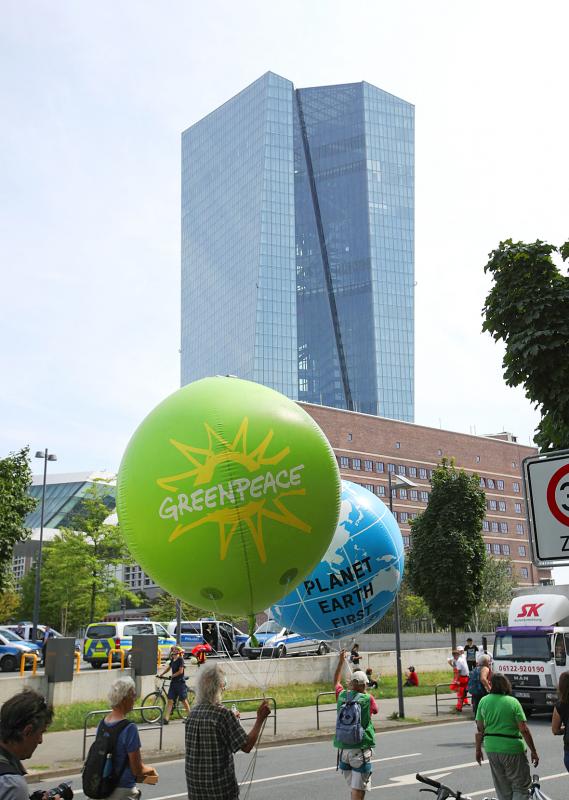The European Central Bank (ECB) is stepping up pressure on lenders to prepare for stress tests next year that would show how vulnerable the industry is to climate change, people familiar with the process said yesterday.
The ECB, which earlier this year voiced displeasure over finance industry efforts to respond to climate risks, has sent out confidential documents to banks stating that they would need to provide data on how their balance sheets might fare through 2050, the people said.
The regulator also plans to study the link between profits and carbon risk in banks’ portfolios, they said.

Photo: AFP
European politicians want banks to become a key plank in the fight against climate change by steering capital away from polluters.
Companies in the region, unlike their peers in the US, tend to rely more on their lenders than on capital markets for financing. Investors are taking note as banks burdened by carbon-intensive loan books might face higher capital requirements, which could erode their power to pay dividends.
A methodology for banks might be introduced next month, one of the people said.
Banks would have to supply the ECB with information that shows how their portfolios might evolve over periods of 10, 20 and 30 years, said the people, asking not to be identified as the documents are private.
An ECB spokesman declined to comment.
The power of EU environmental, social and governance (ESG) standards to disrupt the financial industry played out publicly last month as investors dumped shares of DWS Group after it became the target of investigations for alleged greenwashing.
Although DWS said that it did nothing wrong, the development showed that financial firms, whether banks or asset managers, can no longer afford to underestimate ESG compliance.
The ECB has said its supervisory arm’s stress test next year would rely on banks’ assessments of their exposure to climate change and their readiness to address it.
The test would also be informed by this year’s EU-wide exercise, it added.
The outcomes would be reflected qualitatively by potentially affecting the scores used to calculate individual banks’ capital requirements, it said.
However, the ECB has made clear that it would gradually start to treat climate risks as it treats any other risk by reflecting it in those requirements.
The ECB in July said that hardly any eurozone banks were adequately prepared for the risks they might face from climate change.
It would give banks individual feedback on their plans for addressing the deficiencies identified in the self-assessments this month, one of the people said.
Credit rating agencies have also warned that the industry is behind when it comes to adapting to climate and social risks.
“Apart from the high-level corporate social responsibility statements, banks do not appear to have fully embedded the management of ESG risks into all aspects of their business strategy and business processes, particularly pricing,” said Monsur Hussain, a senior director at Fitch Ratings Inc in London.
Fitch previously said that new capital requirements based on climate risk are the “next logical step” for regulators in Europe.

Macronix International Co (旺宏), the world’s biggest NOR flash memory supplier, yesterday said it would spend NT$22 billion (US$699.1 million) on capacity expansion this year to increase its production of mid-to-low-density memory chips as the world’s major memorychip suppliers are phasing out the market. The company said its planned capital expenditures are about 11 times higher than the NT$1.8 billion it spent on new facilities and equipment last year. A majority of this year’s outlay would be allocated to step up capacity of multi-level cell (MLC) NAND flash memory chips, which are used in embedded multimedia cards (eMMC), a managed

In Italy’s storied gold-making hubs, jewelers are reworking their designs to trim gold content as they race to blunt the effect of record prices and appeal to shoppers watching their budgets. Gold prices hit a record high on Thursday, surging near US$5,600 an ounce, more than double a year ago as geopolitical concerns and jitters over trade pushed investors toward the safe-haven asset. The rally is putting undue pressure on small artisans as they face mounting demands from customers, including international brands, to produce cheaper items, from signature pieces to wedding rings, according to interviews with four independent jewelers in Italy’s main

CULPRITS: Factors that affected the slip included falling global crude oil prices, wait-and-see consumer attitudes due to US tariffs and a different Lunar New Year holiday schedule Taiwan’s retail sales ended a nine-year growth streak last year, slipping 0.2 percent from a year earlier as uncertainty over US tariff policies affected demand for durable goods, data released on Friday by the Ministry of Economic Affairs showed. Last year’s retail sales totaled NT$4.84 trillion (US$153.27 billion), down about NT$9.5 billion, or 0.2 percent, from 2024. Despite the decline, the figure was still the second-highest annual sales total on record. Ministry statistics department deputy head Chen Yu-fang (陳玉芳) said sales of cars, motorcycles and related products, which accounted for 17.4 percent of total retail rales last year, fell NT$68.1 billion, or

In the wake of strong global demand for AI applications, Taiwan’s export-oriented economy accelerated with the composite index of economic indicators flashing the first “red” light in December for one year, indicating the economy is in booming mode, the National Development Council (NDC) said yesterday. Moreover, the index of leading indicators, which gauges the potential state of the economy over the next six months, also moved higher in December amid growing optimism over the outlook, the NDC said. In December, the index of economic indicators rose one point from a month earlier to 38, at the lower end of the “red” light.